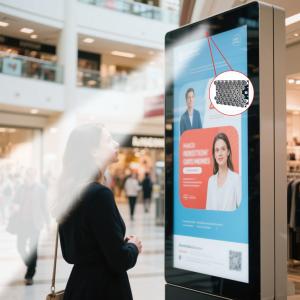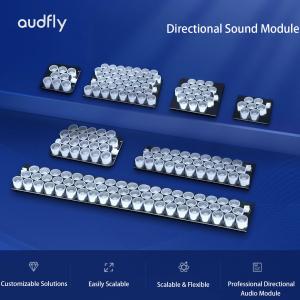Audfly’s New Alpha Series Modules Offer Flexible Options for Directional Sound Integration
Recent releases including the Alpha22 and Alpha43 have seen early adoption across interactive terminals, medical devices, kiosks, and smart public systems — wherever focused sound and audio privacy are essential to the user experience.
“Directional sound is no longer just for specialty installations,” said Dr. James Renner, a consultant in human-machine interface (HMI) systems. “It's becoming a mainstream requirement for differentiated UX. What Audfly offers is not just hardware, but a developer-oriented platform that enables real-world customization.”
Open Architecture for Customization
Unlike conventional speakers, Audfly’s directional sound modules are designed with open integration in mind. With standardized interfaces, flexible mounting formats, and support for array configurations of up to four modules, the Alpha series provides a foundation for scalable acoustic designs that adapt to both compact enclosures and larger, spatially aware systems.
This flexibility has proven valuable for teams working on interactive signage, public service terminals, and AI-driven interfaces where control over sound direction, coverage area, and clarity is essential.
“With Alpha43, we were able to experiment across different kiosk formats without major structural redesign,” noted Soojin Kim, Product Lead at a smart terminal company in Korea. “It’s rare to find a directional sound solution that gives you this much room to innovate without compromising reliability.”
Real-World Impact: Directional Sound in Everyday Interactions
As real-world deployments of directional sound technology expand, users are beginning to recognize its tangible benefits — not just in performance metrics, but in daily interactions. In recent smart terminal pilots, the use of Audfly’s directional sound modules has been linked to increased user engagement and improved wayfinding, particularly in noisy or multilingual environments.
“We noticed people lingered longer at the kiosk, completing more actions without outside assistance,” shared a product manager involved in a multilingual transport terminal deployment. “The focused audio made the interface feel more personal — like the system was speaking directly to them, even in a crowded station.”
This growing engagement is driving adoption across sectors that demand acoustic precision without structural complexity. In healthcare, focused sound projection is helping reduce background audio interference in check-in areas; in self-service retail, it allows brands to create customized audio zones without headphones or physical barriers.
Facilitating Innovation Through Simplified Integration
Early adopters have integrated Alpha modules into diverse applications — from voice-interactive lockers to multi-language digital kiosks — highlighting how directional sound can enhance UX without introducing hardware complexity.
A kiosk integrator working on a smart city project in eastern China shared that Alpha modules helped eliminate acoustic interference in semi-open spaces, without relying on bulky speaker chambers or headsets. In Japan, a self-service terminal developer noted that the plug-and-play design of Audfly’s modules significantly shortened their integration timeline, while maintaining speech clarity with minimal calibration effort.
About the Alpha Series
The Alpha series from Audfly Technology is a family of ultrasonic directional sound modules built for rapid integration into kiosks, terminals, digital signage, and interactive devices. Featuring focused sound projection, modular scalability, and compatibility with directional audio pickup, the Alpha line enables product teams to deploy custom directional sound solutions that enhance clarity, privacy, and user engagement in real-world environments.
Wei Ke
Audfly Technology
email us here
Visit us on social media:
LinkedIn
Legal Disclaimer:
EIN Presswire provides this news content "as is" without warranty of any kind. We do not accept any responsibility or liability for the accuracy, content, images, videos, licenses, completeness, legality, or reliability of the information contained in this article. If you have any complaints or copyright issues related to this article, kindly contact the author above.
Face Compact Market to Reach USD 2.2 Billion By 2031, Top Impacting Factors
USEA To Hold Press Briefing on Data Centers Upending Electric Utilities
The Chopin Law Firm Secures $2 Million Settlement in Commercial Vehicle Injury Case
Więcej ważnych informacji
 Jedynka Newserii
Jedynka Newserii

 Jedynka Newserii
Jedynka Newserii

Farmacja

Nowy pakiet farmaceutyczny ma wyrównać szanse pacjentów w całej Unii. W Polsce na niektóre leki czeka się ponad dwa lata dłużej niż w Niemczech
Jeszcze pod przewodnictwem Polski Rada UE uzgodniła stanowisko w sprawie pakietu farmaceutycznego – największej reformy prawa lekowego od 20 lat. Ma on skrócić różnice w dostępie do terapii między krajami członkowskimi, które dziś sięgają nawet dwóch–trzech lat. W Unii Europejskiej wciąż brakuje terapii na ponad 6 tys. chorób rzadkich, a niedobory obejmują również leki ratujące życie. Nowe przepisy mają zapewnić szybszy dostęp do leków, wzmocnić konkurencyjność branży oraz zabezpieczyć dostawy.
Handel
Wzrost wydobycia ropy naftowej nie wpłynie na spadek cen surowca. Kierowcy jesienią zapłacą więcej za olej napędowy

Sierpień jest trzecim z rzędu miesiącem, gdy osiem krajów OPEC+ zwiększa podaż ropy naftowej na globalnym rynku; we wrześniu nastąpi kolejna zwyżka. Kraje OPEC, zwłaszcza Arabia Saudyjska, chcą w ten sposób odzyskać udziały w rynku utracone na skutek zmniejszenia wydobycia od 2022 roku, głównie na rzecz amerykańskich producentów. Nie należy się jednak spodziewać spadku cen ropy, gdyż popyt powinien być wysoki, a pod znakiem zapytania stoi dostępność ropy z Rosji. Nie zmienia to faktu, że jesienią ceny paliw na stacjach zazwyczaj rosną, a w największym stopniu podwyżki dotyczyć będą diesla.
Nauka
Szacowanie rzeczywistej liczby użytkowników miast dużym wyzwaniem. Statystycy wykorzystują dane z nowoczesnych źródeł

Różnica między liczbą rezydentów a rzeczywistą liczbą osób codziennie przebywających w Warszawie może sięgać nawet niemal pół miliona. Rozbieżności są dostrzegalne przede wszystkim w dużych miastach i ich obszarach funkcjonalnych. Precyzyjne dane populacyjne są tymczasem niezbędne w kształtowaniu usług społecznych i zdrowotnych, edukacyjnych, opiekuńczych, a także w planowaniu inwestycji infrastrukturalnych. W statystyce coraz częściej dane z oficjalnych źródeł, takich jak Zakład Ubezpieczeń Społecznych, są uzupełniane o te pochodzące od operatorów sieci komórkowych czy kart płatniczych.
Partner serwisu
Szkolenia

Akademia Newserii
Akademia Newserii to projekt, w ramach którego najlepsi polscy dziennikarze biznesowi, giełdowi oraz lifestylowi, a także szkoleniowcy z wieloletnim doświadczeniem dzielą się swoją wiedzą nt. pracy z mediami.










.gif)

 |
| |
| |
|